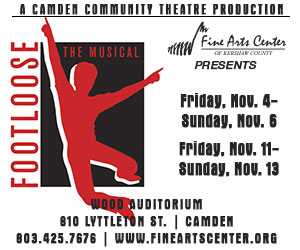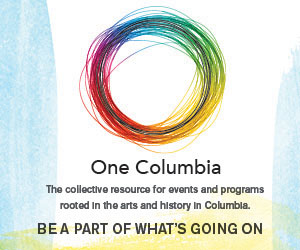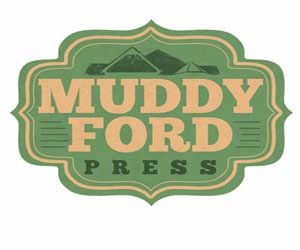Chris Bickel: Columbia’s Dark Lord?
By Kyle Petersen
He’s made stage entrances royally hoisted on a platform carried by his able-bodied underlings. And that trash littering the stage? It’s gay porn. He encourages his audiences to smash stuff and scream at the top of their lungs. Dressed as a preacher, he’s brazenly doled out open-mouth kisses from a booth at an area fund-raiser. He’s hosted a private party to see how many naked humans he could stuff into a phone booth. And he can be spotted alternately in a tidy black suit along the quiet sidelines of an event and costumed as a monster from European folklore accosting pedestrians on the streets of our capital. Columbia artist Chris Bickel is an enigma, and you’d be hard-pressed to fit together his many disparate qualities − from observer, philosopher, and musicologist to punk, satirist, and provocateur. Adored, even worshiped, by many, he’s also widely reviled. And he couldn’t care less which way you swing.
Primarily known over the years as the front man of abrasive and political hardcore bands like In/Humanity and Guyana Punch Line, as well as his experimental music solo project Anakrid, Bickel also has become nearly infamous in the city as the rollicking master of ceremonies for Mr. B’s Goodtime Karaoke Explosion at the Art Bar, his leadership of the queer-metal, politics-meets-partying rock band Confederate Fagg, his long career in some of the city’s best record stores, or for the any number of disruptive, quirky, unsettling, and oddly unifying pranks and spectacles he has taken part in over the years. While his penchant for controversy and blunt, often outrageous, comments and actions have led to a somewhat checkered reputation, it is hard to deny that Bickel is the kind of unique and offbeat artist and performer that can serve as a talisman for an arts scene as quirky and diverse as Columbia’s.
Of course, Bickel demurs when people bring up his status as any sort of leader or force behind Columbia’s underground. “I’m just really bored [a lot],” he explains. “I have to be constantly distracted. … I need to have a million distractions just to stave off depression. If I’m not constantly working on something, I fall off a bit. If I can involve people in that diversion and if it enhances their experience in this town, great, because this town needs a more enhanced experience.”
Throughout his various activities, Bickel’s fascination with “the extremes of highbrow and lowbrow,” as he puts it, is evident. Whether singing “Free Bird” on the steps of the State House grounds while protesting the Confederate flag or scoring horror movies using found-sound sonic collages, there is an endless collusion of the cerebral and the physical, the radical and the silly, the antagonistic and the unifying, in what he does.
In/Humanity
Bickel first came on the Columbia scene with In/Humanity, an innovative hardcore band he started with guitarist Paul Swanson (the band would have a rotating cast of other musicians throughout its lifespan) while both were still attending the University of South Carolina. During the 1990s, this brash, oddly engaging punk band shook up the music scene in town and also had a presence in hardcore circles around the country. “At first we didn’t know what we were doing,” Bickel admits, “but as it went on we were trying to push every boundary we could do as far discordance and speed and even with the lyrics, trying to push buttons.”
Among the things In/Humanity introduced to the hardcore world was the oxymoronic genre “emo-violence.” “It was a joke,” Bickel says smiling. “We were poking fun at all the pigeon holing of things [within hardcore].” The term nonsensically combined the two extremes of the splintering hardcore scene and, while it doesn’t really describe the music at all, it does point to the particular sensibility and self-awareness that would become characteristic of Bickel’s artistic endeavors. The term stuck to the band, and, even today, bands will claim it as well.
From the very beginning, In/Humanity was an important part of the city’s scene but more as a counterweight to other groups rather than a direct competitor. The band appeared on the 1992 Please No Profanity compilation, which also featured future megastars Hootie & the Blowfish, but “we were definitely the opposite of what they embraced and strove for,” Bickel explains. “We didn’t want money; we didn’t even really particularly want people to like us.”
Hardcore punk rock has a different set of attitudes towards what constitutes success. It is not the sort of music that lends itself to casual fans. An offshoot of punk rock that is noisier, faster, and angrier, the songs deemphasize melody and hooks in favor of pounding rhythms, brutal distortion, and screaming, rarely comprehensible lyrics. Bickel is well-aware of the “limited audience” for such work. “Most people are going to listen to it and think it sounds like garbage, blaring noise,” he admits. “It’s too fast to make it out, and you can’t understand the lyrics; you hear frequencies that are very uncomfortable to the ears—most people won’t pay money for that.”
In/Humanity’s sets were often only 15 or 20 minutes long, but they rumbled forward with such intensity and explosiveness that they left the group fairly well exhausted. Bickel likens the performance to primal scream therapy, a chance to let “everything you have built up inside of you to be released.” Coming from this perspective, Bickel says he and Swanson just had “certain ideas we wanted to get out, certain things musically [that they wanted to do].” The appeal to others was a secondary factor, even as the band went on tours and released two full-lengths (The Nutty Antichrist in 1996 and The History Behind Mystery in 1997) along with a slew of EPs.
The band became almost as famous for its esoteric antics as for its music though. After releasing their first EP (a 7”) at their release show and selling 300 copies, the band members decided they didn’t like the recording and wouldn’t let any more people hear it. Instead of simply tossing the pressing, though, Bickel and Swanson turned the records into a different kind of art. “We took compass needles and gauged out different words of phrases into them and gave them away [at shows], even thought they were unplayable,” Bickel explains.
In addition to the inaccessibility of the music, In/Humanity’s performances also made the band rather unlikable. “We really went out of our way to make people hate us a lot of times,” Bickel explains as he gleefully recalls a time when he re-appropriated another local band’s gimmicks. The routine the other band was using involved feeding cereal to the audience members during a cereal-themed song—“it was really corny, so we just wanted to make fun of the whole shtick,” Bickel remembers. So, the band performed the same routine at one of their shows—with a twist. “What the people didn’t know was that I had in advance gone to a bait store and bought a huge Styrofoam cooler of live crickets,” he says fondly. Events transpired pretty much how you would imagine from there. “People just went nuts and were so angry,” Bickel says with a sense of accomplishment. “People were even waiting around to beat us up after the show, and the club told us never to come back.”
Bickel works hard to temper the more antagonistic aspects of his past with a more sobering view of what he was striving for. “We really thought we were doing something then…but we were just pissing people off,” he concludes. Still, Bickel’s enthusiasm for disruption and getting people out of their comfort zones is clear.
Clearly, there is also a degree of sophistication and intellect at work beneath the chaos and abrasiveness of the band in a genre that often seems to boil down thoughts and emotions into simple, brute forces. From the beginning, it seems that Bickel had a taste for the odd, mixing in more angsty tunes with songs that feature extended jokes (“Teenage Suicide-Just Do It!”), political commentary (“Southern Swastika,” “Too Drunk To Molotov”) and song sequences telling murder mystery stories (the last three songs on Side A of The History Behind The Mystery). Even though lyrics in hardcore are often buried in the song, Bickel went out of his way to include lyric sheets in every release the band did. He also did the album’s artwork and wrote extensive liner notes in a style that mirrored the group’s self-aware mix of irony and pathos.
The band toured hard, and eventually won a national following in punk circles. Maximum Rock and Roll, perhaps the most influential punk ‘zine at the time, began writing about In/Humanity and, later, Guyana Punch Line. Within certain circles, In/Humanity became kind of famous. However, around 1997 or so, Bickel and Swanson decided to move forward with a new project.
Guyana Punch Line
Named after the infamous punch line in Jonestown, Guyana, Guyana Punch Line maintains the core partnering of Paul Swanson and Chris Bickel but adds a conceptual twist. Not just a band, the group would also be a vehicle for espousing the Bickel-created philosophy of “smashism.” “I always wanted to have a band centered around a philosophy that was more than just a band,” Bickel explains. “I wanted [the band] to embody something, a sort of live thought.”
The word comes from an unreleased song by the obscure 1970s rock band The Screamers and didn’t have any particular meaning, which Bickel seized on. “It always struck me as a brilliant word, so I sort of obsessed over it for awhile.” He eventually wrote some “dorky manifestos” about what the term meant, incorporating Dadaism and other absurdist philosophies with radical politics in a “melting pot of ideas.”
Musically, Guyana Punch Line was just as uncompromising as In/Humanity had been, calling themselves “an antimusical terror unit,” but the group built naturally on Swanson’s and Bickel’s prior success. All three of their full-length albums would be released via Prank Records, a San Francisco-based punk label that also helped with In/Humanity’s later recordings. The band toured and recorded through 2003.
Anakrid
Around the time Guyana Punch Line got going, Bickel’s solo experimental electronic project also began getting some press. “I’d been doing it all along, but for years it was a very personal thing and I’d been just doing it for myself, occasionally dubbing off tapes for friends,” he says. He was surprised by the largely positive reception he got, though, and one friend went so far as to suggest he should apply for a grant from the Arts Commission—which he went on to apply for and win, paving the way for Anakrid to become a more official project. Now with 10 albums and a few film scores released under the moniker, Bickel now considers it his main musical endeavor.
If possible, the music of Anakrid might be even more difficult to listen to than his hardcore recordings. The sounds that Bickel likes are pointedly unfamiliar and uncomfortable to the ears, as he uses electronic manipulation and found sound recordings to create abstract musical landscapes. “A lot of it does come out scary sounding, because that’s just where my head is at,” Bickel explains, “but … I wanted to create something that really sounded kind of alien. … I want to take sounds and twist them in such a way that it isn’t recognizable, so you can’t always get a clear mental image of what [instruments] were creating the music.” Such a lack of recognition, he suggests, is inherently scary for most people who are afraid of the unknown.
Confederate Fagg
Bickel would briefly play with a slightly more palatable punk band called Newgenics, but his local rise to fame would be as the front man for a conceptually well-honed but musically sloppy band that specialized in the kind of glam-metal popularized by Twisted Sister and Mötley Crüe. What made the band stand out was its electrifying shtick—members dressed in queer clothing, sang songs in protest of the Confederate flag, and exulted in the excesses of rock-and-roll debauchery on stage.
The name for the band came to Bickel first as something he wanted to use, and an impromptu jam session with longtime scene member Jay Matheson led to the band’s formation. The group never took itself too seriously, and their only album came from a single alcohol-fueled night in the studio, but they were a huge hit, something that amused the group to no end. “We thought it was funny, since we were this super-shitty band packing every club in Columbia,” Bickel recalls. More surprising still was the eclecticism of the crowd – young and old, black and white, frat guys and hipster – everybody, apparently, loved the blustery rock and roll and quirky characters the band had created, despite their very provocative mix of politics, challenges to gender and sexual norms, and Spinal Tap-esque level of lyrical sophistication.
In an odd, seemingly paradoxical way, Confederate Fagg fit right in with the idea behind the less-accessible work of In/Humanity and Guyana Punch Line. “It accomplished a lot of the things that I and a lot of other people wanted to accomplish with punk rock, which was this idea of unity,” Bickel says. “Ultimately there’s not a lot of unity in punk rock because it appeals to a very narrow base.” Confederate Fagg, on the other hand, had “all these [different] people in one room, just having a really good time.”
Mr. B
If there is one thing that Chris Bickel is more known for than Confederate Fagg, it the Goodtime Karaoke Explosion he throws at the Art Bar each Wednesday night. After accidentally discovering the joys of karaoke at a friend’s birthday party, Bickel lamented the lack of good karaoke nights in Columbia, so he decided to start his own. With an extensive song selection and a high-energy room like the Art Bar, Wednesday nights at the Art Bar features the kinds of enormous crowds and strong sense of community that the town is too often not credited with having.
Somewhat ironically now, the series was initially meant to be an occasional or one-off event. “The Art Bar didn’t even want to do karaoke at all – I sort of had to twist their arm to let me do it,” Bickel remembers. “And I think they only wanted to do it once a month, on their worse night, but after the first night, they asked me to come back and do it every week.” Aside from a brief break last year where Bickel thought about pulling the plug and was met with an outpouring of support and praise, the series has been going strong for seven years.
The Vinyl Side
In addition to all of these creative outlets, Bickel is also intimately tied to the record store scene in Columbia. One of his first jobs in town was at Manifest Records, and he would go on to start his own store, New Clear Days with Dan Cook in the early 1990s. New Clear Days specialized in punk rock and built quite a reputation for its well-curated inventory, but was difficult to keep afloat in a city like Columbia. After Cook left to join the staff at the Free Times, Bickel moved to the store to Five Points for awhile before selling it off and joining Papa Jazz as the head of the vinyl department.
Responsible for the amazing, high-quality selection of vinyl at one of the best record stores in the Southeast, Bickel travels around buying records from private collectors and also supervises submissions that come through the doors. He’s developed a strong acumen for assessing vinyl over the years and has developed a wildly diverse collection. “When I started my taste were pretty narrow, but as you go along you learn about other things – now my tastes are really broad and I want to buy everything that’s cool,” he explains. Although he works hard at keeping the store’s catalog top-notch, which it is, out-of-town collectors will come in and often spend thousands of dollars on the records Bickel painstakingly procured.
Bickel About Town
Bickel shies away from the term “performance artist,” but many of his activities probably would fit in that category. One summer he went around to various bars persuading people to form human pyramids, which he photographed and posted online. Another time he took pictures of people “outing” their crushes and posted the pictures on Facebook. “I like these things to be disruptive – not necessarily in a bad way – but that takes [people] out of what they are used to doing,” he says. “At first they are really skeptical about it, but then they end up having a good time and having something to talk about for the next week.”
This past Christmas, Bickel got a group of people together to celebrate the pagan Christmas ritual involving Krampus, the mythical creature that serves as a sort of dark counterpart to Santa Claus. “He was sort of a devil that punishes the bad kids,” Bickel says. The idea came from some footage from small alpine towns where the celebration still exists, and Bickel was inspired by the message. “I wanted to pay homage to this neo-pagan tradition, because it seemed like a great antidote to this horrible sense of entitlement in the world we live in – we need something scary like that to keep kids in line.”
In lieu of a more traditional ceremony, though, Bickel merely donned the grotesque mask of Krampus and walked the streets of Columbia, confronting people with his “identity” and talking about the tradition. He’ll do it again this year and continue to “keep it under the radar a little and still have an element of chaos.”
Which is really what Bickel is always doing for Columbia’s art and music scene – keeping it going, under the radar, with just the right kind of chaos.






.jpg)
